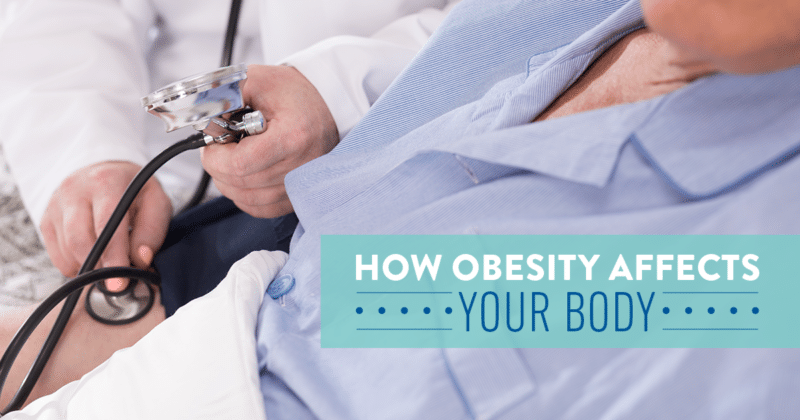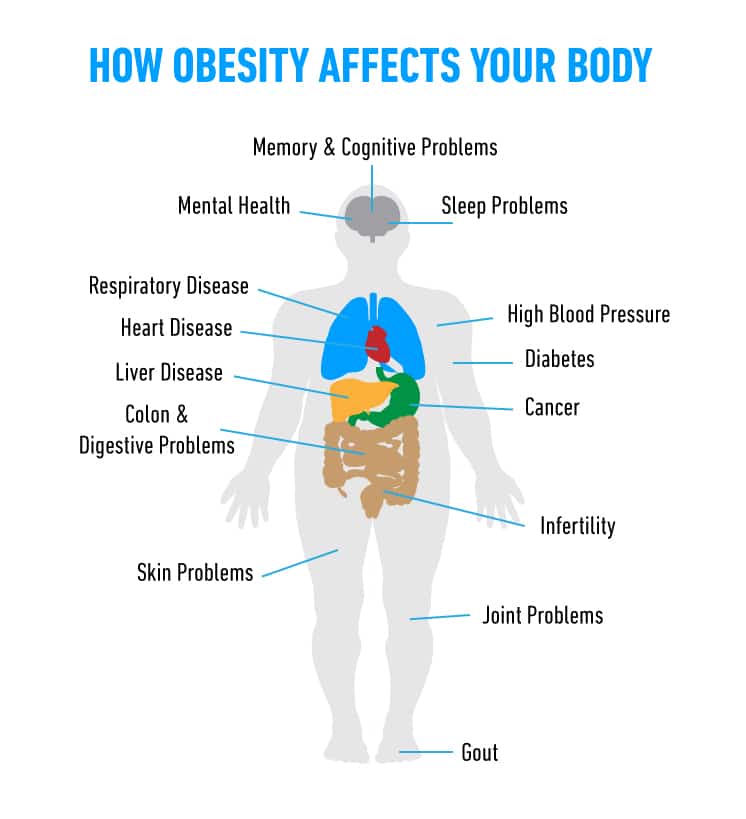
How Obesity Affects Your Body
Obesity affects 1.9 billion adults and 42 million children throughout the world, including more than a third of American adults. Unfortunately, as obesity rates continue to rise, so do rates of serious and potentially fatal health complications.
Obesity’s Effects On The Body
Health care expenses are 42 percent higher for obese people and 81 percent higher for the morbidly obese. However, the health effects of obesity aren’t only expensive to treat. Obesity takes a toll on nearly every aspect of physical health. Its effects on the body create serious health conditions that alter the length and quality of life for obese individuals.

High Blood Pressure
Fat needs oxygen to survive, so your heart must pump additional blood into vessels that nourish fatty tissue. This increased circulation places extra pressure on your arteries. When your heart is forced to pump more blood than usual and your arteries are constricted by fat, your blood pressure rises, leading to chronic hypertension.
Diabetes
Type 2 diabetes is an insulin resistance disorder that increases blood glucose levels. Obesity may trigger it, especially if extra body fat is deposied around the abdomen, and people with BMIs over 35 are 20 times more likely to develop it. If obesity trends continue, 6 million additional Americans could be diagnosed with type 2 diabetes by 2030.
Bariatric surgery resolves diabetes by improving metabolic profiles and restoring hormonal balance. In fact, the metabolic effects of weight loss surgery are so significant that some call it metabolic surgery.
Gout
Gout appears suddenly (in the form of an inflamed toe or joint), but develops gradually when your body contains more uric acid than your kidneys can process. Obesity doesn’t trigger gout directly, but you may develop gout because of poor dietary choices, including excessive amounts of beer, soda, or shellfish.
Cancer
Excess weight is linked to 20 percent of all cancer-related deaths. Obesity increases your risk of many cancers, including breast, kidney, colon, liver, cervix, and prostate. Surgeons also face technical challenges during surgical cancer treatments.
Fortunately, bariatric surgery reduces rates of cancer incidence and mortality. A study published in Obesity found that surgery decreased incidence rates of obesity-related cancers and mortality rates of all cancers.
Sleep Problems
Morbid obesity increases the oxygen you need by up to 70 percent and constricts the passage of air and blood. If your overworked lungs and heart try to overcome these obstructions while you sleep, you may wake up exhausted instead of refreshed. Sleep apnea is a chronic, obesity-related condition that actually causes you to stop breathing during sleep.
Heart Disease
High blood pressure increases your heart attack risk, but extra fat also causes problems within the heart itself. As fatty plaque accumulates in your heart’s arteries, their walls thicken and constrict, triggering coronary artery disease. Symptoms include pain, tightness, and pressure in the chest.
Joint Problems
Obese people are 60 percent more likely to get arthritis. Your weight-bearing joints are most vulnerable, especially those in your lower spine, ankles, hips and knees. Rheumatoid arthritis (RA) is also linked to the inflammatory effects of fat-storing cells on joint tissue.
Mental Health
It’s impossible to discuss obesity’s health effects without acknowledging the link between body weight and mental health. Depression and anxiety contribute to weight gain if overeating is used as a coping mechanism, but obese people also suffer alienation, low self-esteem, and other consequences of prejudice against overweight people.
While obese children are bullied by classmates, obese adults may find strangers, potential employers, and even physicians associate their weight with poor hygiene, incompetence, overindulgence, and dishonesty.
Infertility
Obese women are more likely to suffer miscarriages, and some cannot get pregnant because of menstrual irregularities, polycystic ovary syndrome, or ovulation disorders. Popular treatments include ERT estrogen replacement therapy.. Obese men have lower testosterone levels, increased rates of erectile dysfunction, and higher risks of developing hypotestosteronemia, which curbs sperm production. Common treatments for low testosterone include TRT testosterone replacement therapy.
Colon & Digestive Problems
Your gut contains 70 percent of your body’s bacteria, which performs important functions for your colon. When you eat too many processed foods and red meats, you disrupt the natural harmony of your gut flora and increase your risk of colon polyps and cancer. People with higher BMIs have higher risks of colorectal cancer (CRC), and obesity-related insulin resistance makes it more deadly.
Memory & Cognitive Problems
Cognitive impairment has long been linked to obesity, but now we know why: obesity actually deteriorates your brain’s ability to send and receive important messages. Obese people struggle more with memory and verbal fluency, because they lose some of the white matter that surrounds and protects their vital nerve fibers.
Skin Problems
Rapid or excessive weight gain will stretch your skin’s elastic outer layer beyond normal limits, causing visible stretch marks and preventing it from returning to its original shape. Skin folds also trap moisture and heat, creating a breeding ground for harmful bacteria and increasing your risk of erythrasma, yeast infections, intertrigo, and other localized infections.
Liver Disease
Nutrients and toxins alike must pass through your liver, so anything you consume has the potential to damage it. Just as alcoholics damage their liver with too much alcohol, obese people damage their liver with too much fructose, and many develop fatty liver disease or cirrhosis. Obesity also causes liver tissue to age prematurely – 3.3 years for every ten BMI units.
Respiratory Disease
If you’re obese and frequently “short of breath,” you know excess weight affects your lungs. However, decreased lung capacity isn’t the only issue. Chronic obstructive pulmonary disease (COPD), obesity hypoventilation syndrome (OHS), and even asthma complications are more likely for obese people, because adipose tissue places extra pressure on chest walls and weakens lung muscles.
Reclaim Your Body And Your Life
Research shows that obesity shortens lifespans by up to 8 years, but it could rob you of almost two decades of healthy living. Bariatric surgery is an effective and routine option for those who want to reclaim these years and avoid the costly physical and psychological effects of obesity. Consider your options and talk with your doctor to see if weight loss surgery is right for you.








